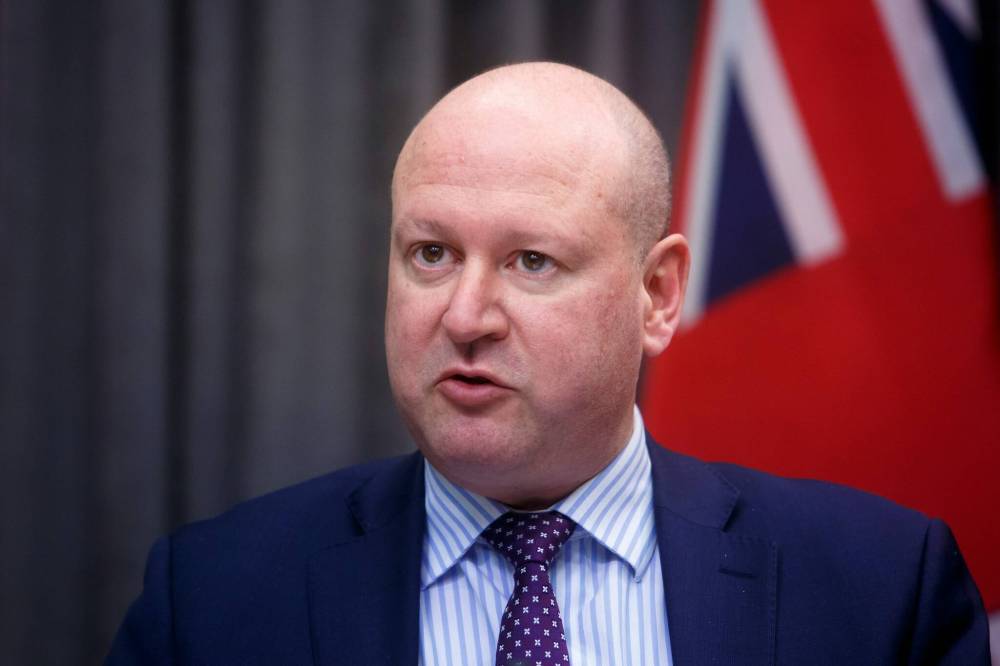Health disparity widens: top doc
Advertisement
Read this article for free:
or
Already have an account? Log in here »
To continue reading, please subscribe:
Monthly Digital Subscription
$0 for the first 4 weeks*
- Enjoy unlimited reading on winnipegfreepress.com
- Read the E-Edition, our digital replica newspaper
- Access News Break, our award-winning app
- Play interactive puzzles
*No charge for 4 weeks then price increases to the regular rate of $19.00 plus GST every four weeks. Offer available to new and qualified returning subscribers only. Cancel any time.
Monthly Digital Subscription
$4.75/week*
- Enjoy unlimited reading on winnipegfreepress.com
- Read the E-Edition, our digital replica newspaper
- Access News Break, our award-winning app
- Play interactive puzzles
*Billed as $19 plus GST every four weeks. Cancel any time.
To continue reading, please subscribe:
Add Free Press access to your Brandon Sun subscription for only an additional
$1 for the first 4 weeks*
*Your next subscription payment will increase by $1.00 and you will be charged $16.99 plus GST for four weeks. After four weeks, your payment will increase to $23.99 plus GST every four weeks.
Read unlimited articles for free today:
or
Already have an account? Log in here »
Hey there, time traveller!
This article was published 20/12/2022 (1090 days ago), so information in it may no longer be current.
Health disparities for racialized Manitobans are getting worse, and policy changes are needed to tackle the systemic causes of poor outcomes, the province’s top doctor said in a new report.
“When we look at the overall health status of people in Manitoba, we see gradual improvements, with longer life expectancy,” chief provincial public health officer Dr. Brent Roussin wrote in the 2022 Health Status of Manitobans report, released Tuesday.
“However, the health of people in Manitoba is not equal, and the gap in health between First Nations and all other people in Manitoba is, in fact, widening.”

The 78-page report authored by Dr. Brent Roussin is the first high-level assessment of Manitobans’ health since 2015. (Mike Deal / Winnipeg Free Press files)
The 78-page report authored by Roussin is the first high-level assessment of Manitobans’ health since 2015.
Under the Public Health Act, the chief provincial public health officer is required to report every four years to the health minister on population health. The latest report was delayed owing to the COVID-19 pandemic.
In his report, Roussin focused heavily on the social determinants of health and inequities between groups that have been historically marginalized and other Manitobans.
Between 2016 and 2020, just over 20,000 Manitobans died prematurely (before the age of 75).
However, for First Nations people, the rate of premature death was three times greater than other Manitobans, the report noted, accounting for 81 per cent of all deaths among First Nations people.
For all other Manitobans, premature deaths accounted for 35 per cent of deaths.
According to the report, the average life expectancy for Manitobans is 82.8 years for females and 78.5 years for males. For First Nations people, life expectancy was about 11 years shorter, and the gap is worsening.
People from lower income areas across Manitoba also have a shorter life span.
“It is important to reflect upon the idea that health disparities are not due to chance, poor life choices, genetics or some other inherent predisposition to poor health outcomes,” Roussin wrote.
From 2016 to 2020, 1,075 Manitobans died by suicide, with significantly higher rates among First Nations people. Meanwhile, 314,631 Manitobans were treated for mood and anxiety disorders, representing a quarter of the population aged 10 and up, between 2017 and 2021.
Between 2019 and 2020, Manitoba also experienced the greatest increase in opioid-related deaths of all the provinces, the report noted.
Roussin offered six high-level recommendations to the minister, including expanded measurement of health disparities, setting goals for reducing gaps, and regular public reporting on health indicators.
“Measuring gaps in health status in our province is necessary to guide actions to improve the health of all Manitobans,” Roussin stated. “When it comes to improving the health of our population, every Manitoban has a role (to) play.
“However, those with the power and privilege to make decisions and set policy direction have a particular responsibility to disrupt and transform public policy, institutional practices and cultural views that further entrench these disparities.”
A spokesman for Health Minister Audrey Gordon said the recommendations are being reviewed.
Manitoba Health Coalition director Thomas Linner said the provincial government has often regarded spending that contributes to better health outcomes for marginalized people as an area to cut to balance the books.
“The lack of access to health care and to different health care options, particularly those living in rural and remote areas, for newcomers… has been exacerbated over a period of time, and that’s regardless of which party is in power,” Linner said.
He noted there is plenty of literature for the government draw from to address health discrepancies for Indigenous people, including the Truth and Reconciliation Commission Reports and the final report of the National Inquiry into Missing and Murdered Indigenous Women and Girls.
“Universal health care is not universal if it is excluding people and it’s treating people differently based on their race, their gender, their sexuality, their immigration status or any other issue like that,” Linner said.
danielle.dasilva@freepress.mb.ca
2022 Health Status of Manitobans Report

Our newsroom depends on a growing audience of readers to power our journalism. If you are not a paid reader, please consider becoming a subscriber.
Our newsroom depends on its audience of readers to power our journalism. Thank you for your support.


